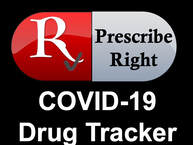|
Hydroxychloroquine
In a 14-day, 423 patient, Phase III trial conducted by the University of Minnesota, hydroxychloroquine did not substantially reduce symptom severity (scale no symptoms to severe symptoms) in outpatients with early to mild COVID-19. Dexamethasone A final version of the preliminary report of the dexamethasone arm of the 11,500 patient RECOVERY trial (NCT04381936) was published in the New England Journal of Medicine. The results included 2,104 patients that received dexamethasone (6 mg for 10 days) compared to 4,321 patients that received supportive care only. Overall 28-day mortality was 22.9% with dexamethasone compared to 25.7% with placebo. The mortality rate for patients on ventilators was 29.3% with dexamethasone compared to 41.4% with supportive care only. Dexamethasone also had a lower mortality rate in patients requiring oxygen, but not on a ventilator (23.3% vs. 26.2%) but did not reduce mortality in patients not receiving respiratory support at enrollment (17.8% vs. 14.0%). Interferon In a 28-day, 81 patient, Israeli trial, adding subcutaneous interferon beta 1a to hydroxychloroquine plus lopinavir/ritonavir or atazanavir/ritonavir did not decrease the time to clinical response, but did increase discharge rate on day 14 and decreased 28-day mortality, compared to not adding interferon in patients with severe COVID-19. Synairgen announced that in a 101 patient trial, treatment with nebulized interferon beta 1a (SNG001) reduced the risk of developing severe COVID-19 and increased the likelihood of recovering in patients hospitalized with COVID-19. Subcutaneous interferon beta 1a is currently being evaluated as a treatment for COVID-19 in the UK’s RECOVERY trial and the WHO-led SOLIDARITY study. COVID-19 Vaccines In a 56-day, 1,077 patient, Phase I/II, British trial (NCT04324606), neutralizing antibody levels after a single dose of AstraZeneca’s and the University of Oxford’s AZD1222 vaccine, peaked at 28-days and remained elevated through day 56 with 90% of participants developing antibodies. A booster dose was given four weeks later to 10 patients and resulted in higher antibody levels. Many patients developed systemic reactions (e.g., chills, fever) compared to meningococcal conjugate vaccine, but the reactions were reduced with acetaminophen. AstraZeneca is working with contract research organization IQVIA to accelerate enrollment and completion of a Phase III trial for AZD1222 as part of Operation Warp Speed. In a 45 patient, Phase I, NIAID trial (NCT04283461), the antibody level increased with higher doses of Moderna’s mRNA-1273 (25, 100 and 250 mcg). Antibody titers further increased with a booster dose at 1-month. All doses produced serum-neutralizing activity that were similar to the levels seen in recovered patients. The incidence of adverse effects was higher after the second vaccination, especially with the 250 mcg dose. In a 508 patient, dose-ranging, Phase II, Chinese trial (NCT04341389), a single dose of CanSino’s COVID-19 vaccine resulted in seroconversion in more than 96% of participants; 85% produced neutralizing antibodies and 90% had T-cell response. As was seen in the Phase I trial, participants that were 55 or older and those with adenovirus immunity had lower humoral responses, but this did affect T-cell responses. The most frequent systemic reactions were fatigue, fever and headache. In a 60 patient, open-label, dose-ranging, Phase I/II, German trial (NCT04380701), participants were given two doses of Pfizer’s and BioNTech’s BNT162, separated by three weeks. The vaccine elicited a dose-dependent antibody response with the 50 mcg dose resulting in neutralizing antibody levels that were three times those in recovered COVID-19 patients. The article also describes the T-cell responses in 36 patients with both CD4 cells (34 patients) and CD8 cells (29 patients). J&J began development work on a single dose vaccine, Ad26.COV2-S in March 2020. A 1,000 patient, Phase I/IIa trial (NCT04436276) is expected to begin on July 22 in the U.S. and Belgium with initial results available in September. Additional trials include a Phase I study in Japan and a Phase II study in the Netherlands, Spain, and Germany. A successful Phase I/IIa trial would lead to a 30,000 patient, NIAID Phase III trial in September. Sinopharm initiated a 15,000 patient, Phase III trial in the United Arab Emirates on 7/16/2020. Guideline Update The NIH has updated its guidelines for the treatment of patients with COVID-19. The updates include recommendations for the use of remdesivir when supplies are limited and use of dexamethasone. The update also includes new clinical evidence regarding lopinavir/ritonavir, hydroxychloroquine/azithromycin, convalescent plasma, kinase inhibitors and immunomodulators. Comments are closed.
|
Stay informed, subscribe to the Prescribe Right Pharmaceutical Pipeline Tracker
Archives
January 2023
Categories |
Services |
Company |
Support |
© COPYRIGHT 2015. ALL RIGHTS RESERVED.
|


 RSS Feed
RSS Feed